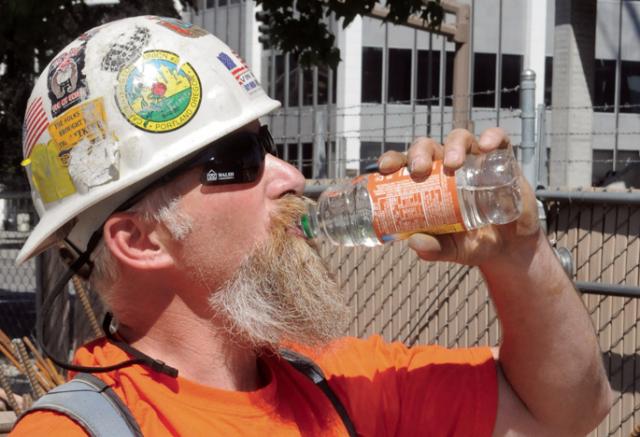
The dog days of summer are upon us. July and August are two of the hottest months in Florida, and we need to do what we can to prevent that heat from affecting us as we work and play.
Working outdoors in hot weather can result in serious illness or even death. Workers exposed to extreme heat may experience symptoms of heat-related illnesses (HRI), such as heat cramps, heat rash, heat exhaustion, fainting, heat stroke and other symptoms. Heat-related illness is also linked to injuries from falls, equipment operation accidents and other on-the-job incidents. Such incidents can happen when someone with heat stress becomes fatigued, dizzy, confused or disoriented.
Tips to avoid HRI:
Hydrate the body. This is probably the single most important prevention method in avoiding heat related injuries. Don't wait until you are thirsty to drink. The time to hydrate is at regular intervals throughout the work-day, whether on break or during the task at hand. Hydration doesn't mean drinking until it hurts. Hydration means a regular, steady intake of water throughout the course of the day. If the work site is someplace where the heat is unusually high, like the South, plan on coupling water with a tablespoon of powdered Gatorade. Gatorade's ingredients are a form of oral dehydration salt and provide the body with much of what is lost through heavy perspiration. To do this cheaply, simply add a 1 tsp. salt and 8 tsp. sugar to a quart of water.
Know the signs of dehydration, heat exhaustion and heat stroke. Recognizing the symptoms, especially for heat stroke, can mean the difference between life and death. Preparation also means bringing along items that will facilitate a safe day on the job. If working remotely, this is especially important. This will include everything from the weather forecast, to a 5-gallon container of water and emergency plans in case of heat illness.
Avoid dehydration. If there is a long, hot day ahead, avoid too much alcohol the night before. Coffee intake should also be kept to a minimum. Both of these liquids are diuretics. Diuretics diminish the body's capacity to hydrate itself by consuming more water than is available. Alcohol, in particular, is especially worth avoiding. When hung-over, part of the nastiness that is felt is from dehydration. Heading to the work site in this condition is both unsafe to the individual and potentially to others.
Protect the body from exposure. Besides the necessary pair of sturdy boots, keep clothing material on the light side as well. Additionally, even if wearing a long sleeves on a site, using a sun block of SPF 50 or higher on exposed areas will give some measure of protection as well.
Pace yourself. Exertion is part of the construction life. Most contractors and sub-contractors have deadlines that have to be met. Other phases of construction often cannot begin until another is finished. With this in mind, there is no room for anything other than getting the job done. But in the end, the individual worker must take care of himself. A steady work rate can still be maintained that will satisfy both site supervisors and, at the same time, maintain the crew's health. Pace plays an important role in heat-related injuries. Union jobs have regularly-scheduled breaks. Non-union jobs, though less regulated, also call for breaks. Workers would be wise to take these breaks in their entirety. On the hottest days, the crew should also pace themselves so they can sustain their efforts throughout the day. Lastly, the crew should be informed that if they do feel any heat-related symptoms, they should simply stop for a minute or two and check in with themselves. A good worker is a healthy one, not one flat on their back.
Tips & Warnings
Heat exhaustion and heat stroke can be life threatening. Knowing the symptoms can save a life. Pay close attention if during the workday any of the following symptoms appear individually or in combination: thirst, headache, dizziness, hot-dry skin, cramps, nausea, confusion, weakness, rapid breathing, weak but rapid heartbeat, low blood pressure and unconsciousness. Contact a supervisor or emergency services as soon as possible if these symptoms appear.